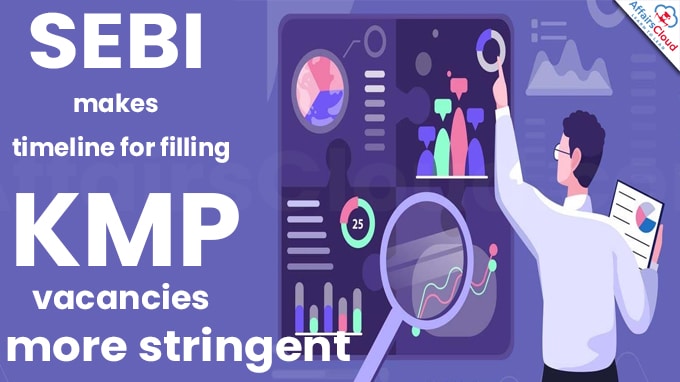
In June 2023, the Securities and Exchange Board of India (SEBI) has introduced a timeline of 3 months for ‘Listed Entities’ to fill up the vacancies of their Key Managerial Personnel (KMPs) such as Chief Executive Officer (CEO), Chief Financial Officer (CFO), Managing Director (MD), Wholetime Director, Manager and Compliance officer to ensure smooth functioning of listed companies.
- An amendment to this effect has been made in the SEBI’s Listing Obligations and Disclosure Requirements (LODR) regulations based on the consultation paper issued by SEBI in February 2023.
Other key regulations:
i.Along with KMPs the listed companies are also now required to fill the vacancies of directors within 3 months.
ii.SEBI also directed the that the listed companies not to fill vacancies of KMPs by appointing a person in an ‘interim capacity’.
- But the appointment could be allowed only if such appointments are made in accordance with the laws applicable in case of a fresh appointment to such office and the obligations under such laws are made applicable to the person coming in an “interim capacity”.
Background:
i.In February 2023, SEBI issued a consultation paper on ‘Streamlining Disclosures by Listed Entities and Strengthening Compliance with SEBI (Listing Obligations and Disclosure Requirements (LODR)) Regulations, 2015‘.
ii.The consultation paper proposes changes to the current regulatory framework for disclosures by listed entities and aims to improve the quality and timeliness of disclosures made by listed companies.
iii.In the consultation paper on LODR Regulations SEBI stated that if an independent director resigns or is removed from the board of directors of the listed entity, they should be replaced by a new independent director by the listed entity at the earliest but not later than three months from the date of such vacancy.
What is meant by “Listed entity”?
Listed entity means an entity which has listed, on a recognised stock exchange(s), the designated securities issued by it or designated securities issued under schemes managed by it, in accordance with the listing agreement entered into between the entity and the recognised stock exchange(s).
Purpose of the timeline:
i.With regard to the LODR regulations, one of the key functions of the Board of directors (BoD) of a listed entity is to oversee succession planning of KMP like compliance officer, CFO and CEO.
- Accordingly, as per the SEBI consultation paper the BoD of the listed entity should ensure that the vacancies of such personnel are filled up in a timely manner.
ii.The new three months timeline for listed entities is stricter than the six months window which was currently being provided under the Companies Act 2013 for filling the vacancies of KMPs (Company Secretary, CFO and CEO/MD/WTD/Manager).
- The norms under the Companies Act 2013 apply to unlisted companies.
-SEBI Issued Restriction of products offered on an Online Bond Platform:
SEBI has restricted Online Bond Platform Providers (OBPPs) from offering products other than listed debt securities on their Online Bond Platform (OBP) or any other platform website, products or services.
- SEBI has issued a circular specifically aimed at Online Bond Platform Providers, emphasizing the need to comply with Regulation 51A of the SEBI (Issue and Listing of Non-Convertible Securities) Regulations, 2021.
Who is OBPP and What is OBP?
OBPP is defined as any person operating or providing an online bond platform’and OBP is any electronic system, other than a recognised stock exchange or an electronic book provider platform, on which the debt securities which are listed or proposed to be listed, are offered and transacted.
Other Restrictions:
i.As per the SEBI’s regulation, OBPPs need to register themselves as stock brokers in the debt segment of the stock exchange.
ii.The holding company, subsidiary, or associate of an OBPP are not permitted to utilise the name, brand name, or any name resembling that of the OBPP for offering products and services that are not regulated by a financial sector regulator such as SEBI, Reserve Bank of India (RBI), Insurance Regulatory and Development Authority of India (IRDAI), or The Pension Fund Regulatory & Development Authority (PFRDA).
iii.If the OBP or any other platform/website of OBPP has any link/ tab to websites/ platforms of its holding company, subsidiary or associate, undertaking any activity or offering products/ securities or services that are regulated by other financial sector regulators, the disclaimer of ‘<Name of the product> is regulated by <RBI/ IRDAI/ PFRDA>’ need to displayed in legible font once the link/tab is clicked
Cause for the issue of Restrictions:
i.SEBI has issued the restriction as it has noted that certain OBPPs are offering products other than listed debt securities and debt securities proposed to be listed through a public offering on their platforms.
- They are also offering unlisted bonds on a separate platform or website and have not divested such offerings.
- Moreover, certain OBP providers have given a link on the online bond platform to another platform for transacting in unlisted bonds and other products.
ii.These practices are in contravention of NCS (Issue and Listing of Non-Convertible Securities) Regulations.
Securities that can be offered on Online Bond Platforms:
i.SEBI has revised the Clause 5.2 of OBP circular and allowed inclusion of a few new product categories such as government securities and listed sovereign gold bonds.
ii.Under the revised clause 5.2, OBPPs could offer listed debt securities, listed municipal debt securities and listed securitised debt instruments; debt securities, municipal debt securities and securitised debt instruments proposed to be listed through a public offering; listed government securities, state development loans and treasury bills; and listed sovereign gold bonds.
Recent Related News:
The Securities and Exchange Board of India (SEBI), India’s capital markets regulator, has issued a circular on the use of brand names or trade names by Investment Advisers (IAs) and Research Analysts (RAs), following its previous publication of an extensive set of guidelines for advertisements issued by these entities.




